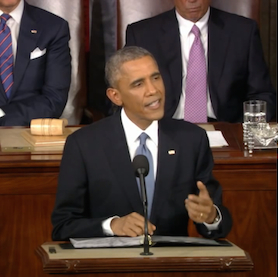 Last week the White House provided more details about the new $215 million Precision Medicine program that President Obama briefly mentioned during his State of the Union address.
Last week the White House provided more details about the new $215 million Precision Medicine program that President Obama briefly mentioned during his State of the Union address.
"Tonight, I'm launching a new Precision Medicine Initiative to bring us closer to curing diseases like cancer and diabetes — and to give all of us access to the personalized information we need to keep ourselves and our families healthier," President Obama said during the SOTU on January 20th.
According to an explanatory piece penned by NIH Director Dr. Francis Collins and NCI Director Dr. Harold Varmus that was published in the New England Journal of Medicine last week, the White House initiative has a wide scope and will even include the use of mobile health technologies.
"The concept of precision medicine — prevention and treatment strategies that take individual variability into account — is not new; blood typing, for instance, has been used to guide blood transfusions for more than a century," they write. "But the prospect of applying this concept broadly has been dramatically improved by the recent development of large-scale biologic databases (such as the human genome sequence), powerful methods for characterizing patients (such as proteomics, metabolomics, genomics, diverse cellular assays, and even mobile health technology), and computational tools for analyzing large sets of data. What is needed now is a broad research program to encourage creative approaches to precision medicine, test them rigorously, and ultimately use them to build the evidence base needed to guide clinical practice."
Health tracking via mobiles will be integral to the administration's planned longitudinal study of 1 million or more Americans. The envisioned study will aim to better assess disease risk, better understand disease mechanisms, and better predict optimal therapies for patients. Study participants will volunteer to be a part of it and would give their consent to have extensive biologic specimens collected as well as their behavioral data, which is where digital health tools would come in, and have it all linked to their EHRs. Importantly, the study participants would also be given access to the information collected about them, according to the directors.
"The initiative will encourage and support the next generation of scientists to develop creative new approaches for detecting, measuring, and analyzing a wide range of biomedical information — including molecular, genomic, cellular, clinical, behavioral, physiological, and environmental parameters," the directors write. "Many possibilities for future applications spring to mind: today's blood counts might be replaced by a census of hundreds of distinct types of immune cells; data from mobile devices might provide real-time monitoring of glucose, blood pressure, and cardiac rhythm; genotyping might reveal particular genetic variants that confer protection against specific diseases; fecal sampling might identify patterns of gut microbes that contribute to obesity; or blood tests might detect circulating tumor cells or tumor DNA that permit early detection of cancer or its recurrence."
In some ways this massive study is reminiscent of Google's Baseline study, which is just starting out with 175 participants. Google aims to establish genetic biomarkers related to food and drug metabolization; how fast a person's heart beats while under stress; and how chemical reactions change the behavior of their genes. Google's study is focused on "well" patients and will include genome sequencing and the collection of 24/7 data from digital health sensors worn by participants. Google's recent partnership with Biogen to study MS with help from wearable sensors is another relevant effort.
(For more head over to Forbes, where David Shaywitz has a great first-person recap of the White House's briefing on the initiative last week, including a lot of helpful analysis and countless relevant links.)
While he didn't make any overt references this year, President Obama has highlighted digital health in some way every other year during past SOTUs. In 2013 First Lady Michelle Obama invited mobile health entrepreneur Dr. Peter Hudson as a guest. Hudson co-founded iTriage, which was acquired by Aetna. In 2011 the president highlighted mobile-enabled video visits between patients and physicians as a reason to bolster the nation's high-speed internet and mobile data networks.












